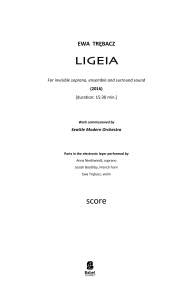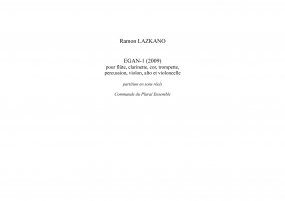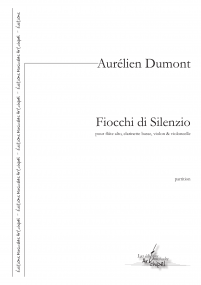Recherche avancée
Octet
for ensemble
9,27 €
Version numérique (+0,00 €) à télécharger
Version papier (+14,80 € impression et livraison ). Colissimo7-14 days aprox.
Chez BabelScores, quand vous achetez une partition, vous pouvez ensuite contacter directement le compositeur ici même !
Caractéristiques
Region
Europe
Estimated Duration
1 - 5min
Date
2009
ISMN : 979-0-2325-1717-9
In Stock
Notes sur cette pièce Octet takes inspiration from Herberto Padilla’s evocative poem Cuban Poets Do Not Sleep, by attempting to depict some of the intricacies of the inner struggle experienced by many artists working in times of national crisis and military action. Can, and should, one continue to give expression to the creative imagination at the expense of responsibility and seriousness in the face of problems in society?
Octet therfore contrasts two different groups of material which are placed in regular conflict. At the opening a set of ideas is presented that are fantastical in character: a series of wind flourishes freely punctuate and connect a constantly evolving melodic idea (which is never presented in its definitive form) in a whimsical fashion, sliding between textures and rhythmic feels by association.
However, the music soon grows more agitated, signalling the beginning of the contrasting dance-like section, which proceeds by more logical steps, with a focussed emphasis on one interval: the fourth.
Once established, these contrasting ideas then enter into a struggle for prominence. Towards the end of the first fast section it is the fast woodwind flourishes that appear to have won, converging on a unison pitch at the top of the register: yet the longer this lasts, the more unlikely it seems that there can be any kind of resolution in this conflict.
At the ending what appears to be a build up leading back into a reprise of the dance-like material instantly collapses, leaving only the bass clarinet, which itself is unable to settle on either the fourths of the dance-material or the free flourishes of the opening.
Ajouter à une playlist
- Identifiez-vous pour créer une liste
Octet therfore contrasts two different groups of material which are placed in regular conflict. At the opening a set of ideas is presented that are fantastical in character: a series of wind flourishes freely punctuate and connect a constantly evolving melodic idea (which is never presented in its definitive form) in a whimsical fashion, sliding between textures and rhythmic feels by association.
However, the music soon grows more agitated, signalling the beginning of the contrasting dance-like section, which proceeds by more logical steps, with a focussed emphasis on one interval: the fourth.
Once established, these contrasting ideas then enter into a struggle for prominence. Towards the end of the first fast section it is the fast woodwind flourishes that appear to have won, converging on a unison pitch at the top of the register: yet the longer this lasts, the more unlikely it seems that there can be any kind of resolution in this conflict.
At the ending what appears to be a build up leading back into a reprise of the dance-like material instantly collapses, leaving only the bass clarinet, which itself is unable to settle on either the fourths of the dance-material or the free flourishes of the opening.
Instrumentation
Flute|Clarinet|Horn (French Horn)|Percussions|Harp|Violin|Viola |Cello
Recording
members of the BBC Symphony Orchestra and Guildhall Artist Fellows
Score Details
Format - A4 / US Letter
Pages - 26
Pages - 26





